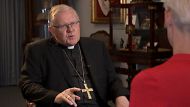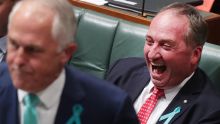Two world views could hardly be more in sync than Andrew Bolt and Miranda Devine's. From immigration to same-sex marriage to economics, pick any issue and you'll invariably find the News Corp columnists in agreement.
But on Monday night, with Cory Bernardi's defection from the Liberal Party looming, the two were live on radio tearing each other apart.
More National News Videos
Bolt and Devine clash on-air
3AW and 2GB commentators Andrew Bolt and Miranda Devine have a heated on-air clash.
"For Christ's sake Miranda!" Bolt seethed. "If you keep interrupting me I'm afraid I'm going to hang up."
The thought of talking politics with Devine over the next five weeks, Bolt said, sounded like a "living hell".

"This is my show so you don't dictate to me what I do," Devine shot back.
It was gripping, if excruciating, radio; those who loathe their views found it hilarious. But this was no mere radio tiff: here was the ultimate symbol of the state of right wing politics today.
Everywhere you look on the conservative side of politics, fellow travellers are feuding and old alliances are crumbling.
Just look at Bernardi and Tony Abbott, who also agree on pretty much everything. The former friends have spectacularly fallen out, with Bernardi accusing Abbott of leaking against him to the media.

For Bolt and Devine, the crux of their dispute is Turnbull's leadership. Bolt thinks the PM is a "busted flush" guaranteed to lose the next election; Devine thinks removing another leader would be electoral suicide.
Inside the Coalition party room itself, it's easy to place most MPs in the "moderate" or "conservative" camps. But those labels disguise deep divisions within the two wings - especially among the conservatives.
Take Abbott, Eric Abetz and Kevin Andrews. Prominent conservative figures from the Howard era, they are known internally as the "old guard" or "Dad's Army". Permanently exiled to the backbench by Malcolm Turnbull, all three are happy to make life difficult for the PM.
They're jockeying for their own advancement, not lobbying for a return to Abbott
As news of Bernardi's departure broke, Abetz went on Sky News and said it showed the government needed to embrace conservativism. Yet Turnbull has already given ground to conservatives on same-sex marriage, superannuation, climate policy and section 18C of the Racial Discrimination Act.
Asked repeatedly what policy he wanted changed, Abetz couldn't say. The point wasn't to get a policy win; it was to make life tricky for Turnbull.
It's a different story with younger conservatives such as Peter Dutton, Michael Sukkar and Zed Seselja. Unlike the old guard, they believe their best days are ahead of them. They're jockeying for their own advancement, not lobbying for a return to Abbott. It's in their interests, at least for now, to make the Turnbull government work.
Then there are the policy divisions - such as same-sex marriage. Abetz, Andrews and Abbott are opposed to change and will do whatever it takes to delay it happening. Other supporters of traditional marriage - including cabinet ministers - have come to accept change as inevitable and think it should be dealt with soon.
As for economics, Bernardi is a classic small government economic rationalist. Many speculated Nationals MP George Christensen may join him in his new party, but this was never going to happen. Christensen is a populist who wants a return to tarrifs and industry subsidies. His economic views are more in line with those of Donald Trump and Pauline Hanson.
Bernadi left the government because he's sick of the compromises required by major party politics. He's got this in common with voters, who are increasingly willing to shop around for a candidate who truly represents their values.
This is seen in the re-emergence of One Nation, currently polling around 8 per cent of the national vote and far higher in Queensland. This is mostly at the expense of the Coalition, whose primary vote has sunk below Labor's.
The Coalition can never out-do Hanson on an issue like Muslim immigration because it needs to win voters in the centre to form government. Meanwhile Nick Xenophon can pick off voters in South Australia with a popular protectionist platform.
Coalition MPs have long delighted in watching Labor fighting with the Greens for votes in the inner cities. Now it's them seeping votes to minor parties on the right.
The foundations of the Liberal Party's broad church - big enough until now to house both liberals and conservatives - are being given an almighty shake.
Follow Matthew Knott on Facebook for more
















204 comments
Comment are now closed